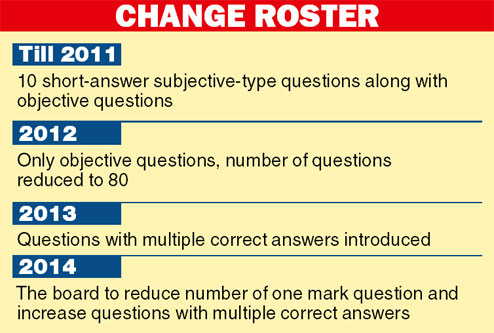 |
The state JEE board plans to introduce more questions with multiple correct answers in next year’s exam to minimise the chance of examinees gaining by guesswork and reduce the number of questions so that they can spend more time on each.
The board is likely to announce the revised format, including the number of questions in each paper, before Puja, said an official.
The two-hour, 100-marks maths paper in this year’s JEE had 80 multiple-choice questions (MCQs). The 90-minute, 75-marks physics and chemistry papers had 55 MCQs each.
“As objective questions with multiple correct answers, which were introduced this year, helped us screen examinees better, we are going to increase the number of such questions. We don’t think a minute and a half is sufficient for answering these questions and want to allot more time to answer these,” said the official.
“The number of MCQs with single correct answer will be slashed to increase the number of questions with multiple correct answers.”
In 2013, five of the questions carrying two marks each in each of the papers had two, three and even four correct answers among the four options. Those who marked all the correct answers scored full marks.
No mark was awarded to an examinee who chose an incorrect option. There was, however, no negative marking for these questions.
For the other two-marks questions, 0.66 was deducted for every incorrect answer. For questions carrying one mark each, 0.33 was deducted.
This year performance in five 2-marks questions carrying multiple correct answers in maths, physics and chemistry were factored in to break ties. This was one of the 11 rules used to break score ties.
Candidates performing better in these questions were awarded higher ranks, said a board member. The academic sub-committee of the JEE board had proposed changes in the format after analysing the results of this year’s exam, said sources.
Bhaskar Gupta, chairman, JEE board, said: “The committee has discussed these changes. A decision will be taken after another round of meeting.”
A JEE board member admitted that the board was set to make the exam tougher through the proposed changes. “Our intention is to curb the practice of getting through by random marking. We want to increase the screening layers,” said the member.
While in 2012 all the candidates who wrote engineering entrance were given ranks, the board this year awarded ranks to only those who obtained the minimum positive score — 0.33.
This year a little over 87,000 of the 1,10,000 examinees were awarded ranks.
“This year, 16,000 seats have remained vacant in engineering colleges. There is no point in lowering the bar to fill up seats at private colleges. Rather, it is advisable to have a quality pool of students capable of studying engineering and getting jobs,” explained the member.
In 2012, the board had reduced the number of questions to 80. Till 2011, those appearing for mathematics had to answer 80 one-mark MCQ questions and 10 short-answer-type subjective questions, carrying two marks each. In the combined physics and chemistry paper of 100 marks, the examinees wrote 90 questions of which 10 were short-answer type.
The board had scrapped subjective questions in 2012 and a year later split physics and chemistry into two papers, each carrying a weightage of 75 marks.
The JEE board also plans to hold a biology test next year to enable students to study BPharm after clearing the JEE.
Students with physics, chemistry and biology as their subjects had to take the JEE maths test this year to study BPharm since the biology option was absent.
Students with even negative marks in mathematics qualified for the bachelor’s course in pharmacology at all institutes except JU this year.










